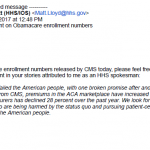healthcare
Earlier this month, news broke of a study that found potentially health-harming chemicals in a variety of fast food packaging. Upon hearing such news, the natural inclination is to worry that you’re ingesting those chemicals along with your burger and fries. Study researcher Graham Peaslee says that’s certainly a risk. But perhaps the greater risk, he says, happens after that hamburger wrapper ends up in landfill and the chemicals seep into our environment and water.
The chemicals in question are per- and polyfluoroalkyl substances (PFASs), which are used to make consumer products nonstick,…
The anti-vaxxers were out again this week, spreading misinformation and debunked science about an intervention that’s saved millions of lives and prevented immeasurable human suffering. It’s unconscionable.
That person is Robert F. Kennedy Jr., who — to repeat — is not a doctor, not a scientist, not a public health practitioner, not an expert in vaccinology. Regardless, he told the press earlier this year that President Trump had asked him to chair a vaccine safety commission, even though the country already has one of those — it’s called the Advisory Committee on Immunization Practices and…
Fewer economic opportunities may be exposing black and Hispanic workers to an increased risk of workplace injury, according to a new study.
Published this month in Health Affairs, the study set out to document differences in the risk of occupational injury and in the prevalence of work-related disabilities between white and minority workers. Researchers found that even after adjusting for variables such as education, sex and age, black and foreign-born Hispanic workers often worked in jobs with the highest injury risks and thus, experienced higher rates of work-related disabilities as well.…
Today, The Pump Handle had its own bizarre experience with the Trump Administration. It came via an email sent by HHS spokesperson Matt Lloyd to members of the Association for Health Care Journalists. Some of those professionals were reporting on the data released today by the Centers for Medicare & Medicaid Services (CMS) on insurance enrollment on Healthcare.gov. The 90-day open enrollment period ended this week.
CMS's plain-spoken news release indicates that 9.2 million individuals selected plans from the ACA marketplace, including three million new consumers. Many of these Americans…
We’re just a humble little public health blog. But we can still do our part. If you or someone you know need help getting health insurance coverage before next week’s enrollment deadline on Jan. 31, here are some good resources.
First, why do this? Because this week, the Trump administration abruptly canceled advertising and outreach scheduled to run during this final week of Affordable Care Act enrollment. Apparently, he even pulled ads that were already paid for. But, you can still enroll. According to Paul Demko at Politico:
(The Trump administration) is also halting all media outreach…
Because taking health insurance away from millions of Americans isn’t bad enough, President-elect Trump has reportedly asked an outspoken critic of vaccines — a man who supported the thoroughly debunked notion that vaccines are linked to autism — to lead a commission on vaccine safety.
That man is Robert Kennedy Jr., who in 2005 wrote a “expose” published in Salon and Rolling Stone arguing that thimerosal, a preservative in vaccines, is tied to autism. Salon retracted the article after critics “further eroded any faith we had in the story’s value.” Rolling Stone dumped the story too. More…
The Pump Handle is on a holiday break. The following, which was originally published on July 8, is one of our favorite posts from 2016.
by Kim Krisberg
In 2005, the World Health Assembly adopted a revised version of its International Health Regulations, a legally binding treaty among 196 nations to boost global health security and strengthen the world’s capacity to confront serious disease threats such as Ebola and SARS. A decade later, just one-third of countries have the ability to respond to a public health emergency. That’s why Rebecca Katz thinks it’s time to get creative.
“How can we…
As 2016 comes to a close — and 2017 looms with enormous uncertainty — let’s end the year with some encouraging public health news. This time it’s a study on one of the 10 great public health achievements of the 20th century: fluoridation.
Published this month in Health Affairs, the study is an update on a 2001 study that marked the most comprehensive examination to date of community water fluoridation benefits and costs. This new study found that in 2013, more than 211 million American residents had access to fluoridated drinking water. That fluoridation was associated with the prevention of…
If you work in public health, you've probably heard about the new era of practice — an era being dubbed Public Health 3.0. Among the components that define this new phase is an emphasis on building cross-sector collaborations to affect the social determinants of health. In other words, public and private sectors have a role — and a stake — in improving community health. And now there’s evidence that such collaborations can save people's lives.
In a study published in November in the journal Health Affairs, researchers set out to see whether communities that convened multisector networks to…
CDC: U.S. life expectancy declines, death rates up for heart disease, diabetes, unintentional injury
For the first time in more than two decades, U.S. life expectancy has dropped.
This week, the Centers for Disease Control and Prevention reported that in 2015, U.S. life expectancy at birth was 78.8 years — that’s a decrease of 0.1 year from 78.9 years in 2014. Among males, life expectancy went from 76.5 years to 76.3 years; among females, it went from 81.3 years to 81.2 years. According to news reports on the findings, no one single factor caused the drop, but it’s still a cause for concern. Over at The New York Times, Katie Rogers reports:
Dr. Peter Muennig, a professor of health policy and…
At Stat, Eric Boodman reports on whether a Trump administration might deprive miners of compensation for disabilities related to black lung disease.
In particular, Boodman examines a little-known provision in the Affordable Care Act (ACA) that shifted the burden of proof from miners and onto mining companies. In other words, if miners had spent at least 15 years underground and can prove a respiratory disability, it’s assumed to be an occupational illness. However, if the ACA is repealed in full — as candidate Trump promised on the campaign trail — that provision would go away as well, making…
More than 2 million U.S. adults may be living with workplace-related asthma, according to new data from the Centers for Disease Control and Prevention.
Published this week in CDC’s Morbidity and Mortality Weekly Report, the study is based on data from the 2013 Behavioral Risk Factor Surveillance System (BRFSS) industry and occupational module, which gathered information from 21 states for adults ages 18 and older who were employed or had been out of work for one year or less. Among the survey respondents, 7.7 percent had asthma, with researchers estimating that upward of 2.7 million adults…
The percentage of Americans who reported cost-related barriers to health care dropped from 37 percent in 2013 to 33 percent in 2016 — a change that directly corresponds to insurance expansions under the Affordable Care Act, a new study reports. On the flip side, Americans are still more likely than peers in other high-income nations to face financial obstacles to health care.
The study is based on findings from a survey of patients and providers in 11 countries and one that the Commonwealth Fund has been conducting annually since 1998. Those 11 countries are: Australia, Canada, France,…
In 2005, Florida legislators passed the nation’s first “Stand Your Ground” law, expanding legal immunity for residents to use lethal force when they believe they’re being threatened. A decade later, a new study finds that Florida has experienced a significant increase in homicides, while states without such laws have not.
“From a public health perspective, we were shocked that in a given area, rates of people dying changed so abruptly and in such a sustained way,” study co-author Douglas Wiebe, an associate professor of epidemiology at the University of Pennsylvania Perelman School of…
More and more of America’s adolescents and young adults are struggling with depression, especially young women, according to a study released earlier this week.
Published in the journal Pediatrics, the study found that the rate of adolescents who reported a recent episode of clinical depression increased by 37 percent between 2005 and 2014. Among girls, one in six reported a bout of clinical depression in the last year. In particular, the 12-month prevalence of a major depressive episode increased from 8.7 percent in 2005 to 11.3 percent in 2014 among adolescents, and from 8.8 percent to 9.6…
Three days out from the election and many of us are still trying to adjust to this new reality. It’s been a very rough week.
And assuming that we take the new president-elect at his word — that we believe the promises he made on the campaign trail — public health workers and advocates, as well as the often-vulnerable people and communities they serve, now face a very difficult four years. Fortunately, public health has plenty of practice confronting and overcoming powerfully entrenched interests for the greater good. Just ask Big Tobacco.
In that vein, below are excerpts from post-election…
I’m not easily shocked to learn about injustice against workers. But my jaw hit the floor in fall 2013 when I read Chris Hamby’s 2013 Pulitzer Prize winning series on the lengths to which coal companies go to dispute that miners have coal-dust related lung disease (a.k.a. black lung.) My jaw hit the floor a second time when Hamby (then with the Center for Public Integrity) exposed that Johns Hopkins University and its employee Dr. Paul Wheeler where star players on the coal operators’ teams.
The families of Steve Day, 67, and Junior McCoy Barr, 79, have now filed a lawsuit against the…
At The New York Times, Dan Barry reports on the Hispanic hotel workers who are becoming a powerful political force in Las Vegas. In particular, the story focuses on the 56,000-member Culinary Union, whose membership is more than half Hispanic. The story is told through the eyes of Celia Vargas, 57, a guest room attendant at a hotel along the famous Vegas Strip — Barry writes:
Despite their name tags, guest room attendants are anonymous. They go unnoticed by many as they push their 300-pound carts to the next room, and the next.
A glimpse of what is expected of these attendants can be found at…
Kim Krisberg and I were in Denver this week at APHA’s 2016 Annual Meeting and Exposition — the year’s largest gathering of public health professionals. In our blog posts from earlier this week (here, here, here) we recapped just a few of the scientific sessions and events from the week. Below are some highlights from the final day at the meeting. You can read many more courtesy of the APHA Annual Meeting Blog.
Public health in the headlines: How does news coverage impact health?: Media. It’s everywhere these days. So, it’s not surprising that it impacts our health and behaviors as…
The American Public Health Association (APHA) adopted 11 new policy statements which will guide its work in the coming years. They include:
Raising the minimum wage: The policy calls on states to increase their minimum wage, index the minimum wage to inflation, and prohibit state-government preemption of municipal minimum wage policies. Among other things, the new APHA policy also recommends research on the effects of living wages on public assistance budgets.
Reducing exposure to highly fluorinated chemicals: The policy calls on Congress to fund research on alternatives to perfluoroalkyl and…

